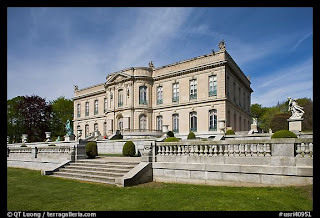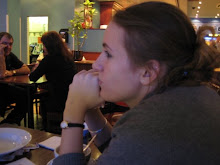I've just been reading a few essays in a collection of literary criticism focused on the Harry Potter series: Mapping the World of Harry Potter. While I'm fascinated by the idea of taking popular work (whether fiction, TV, etc.) and looking at it critically, I'm confused by these particular writers' opinions. Both essays look at the intersection of Harry Potter and religion (Elizabeth DeVos's "It's All About God" and Marguerite Krause's "Harry Potter and the End of Religion"), and while they seem to come to absolutely contrary conclusions, both authors seem to agree on the premise that Harry Potter somehow poses a powerful threat to the world's Christians (the certain individuals "who believe they can only find that magic through narrow interpretation of a very different set of books").
And I'm perplexed.
Krause's argument centers on the idea that Christians' true antagonism to Rowling's books, rather than being enmeshed in a fear of witchcraft in the text, is actually centered on the much more legitimate fear of the absence of any religion whatsoever. Rowling, Krause argues, presents a world where religion is irrelevant, never thought about, never discussed, and never present in any guise. Rowling's characters make their decisions with no input from any higher power, relying on themselves for judgments of right and wrong, and rendering all morality to a state of relativity.
And here I have to pause, for this just feels all wrong to me. Are we really going to argue that there is no moral compass in Rowling's books? Has there ever been a clearer exploration of good and evil? Of the impact of small choices upon the fabric of the human soul? I think where we have diverged, Kraus and I, is in our definitions of religion. Kraus wants evidence of "an organized system of belief centering on a supernatural being or beings." In the absence of such organized systems, she sees the absence of God. I, on the other hand, tend to find organized systems of belief rather irrelevant and unhelpful. Created by humans in an attempt to claim the divine, they in no way encompass God. On the contrary, God is present in Harry Potter in every moment of true kindness, every time a friend is willing to die for his or her companions, every decision that chooses goodness, mercy, and love over evil, cruelty, and hatred. If God is real, the "I am" the bible claims, then Christians should be the last to need labels in order to find God's presence in texts, and in life.
There is no overt mention of Christianity in The Chronicles of Narnia or The Lord of the Rings. Does that mean they are not Christian texts? Are they only Christian texts because we can rest assured in the "christian-ness" of the authors? I hope not. I hope it is because they are full of things like sacrifice and goodness, the attributes of a God who does not need a name to be recognized.
Tolkien and Lewis, I think, would be the first to recognize God in the Potter books. Recognize God, at least in part, for the reasons DeVos puts forward: an awakening of wonder. They were among the first to argue (passionately and academically) for the significance of fantasy, a genre that reminds us of the true magic we long for. A magic present in our everyday lives, yet rendered unrecognizable by the blinders we've accepted against truth. As such, I resonate with much of DeVos's essay, an essay that pleads for new eyes to see the world we live in -- new eyes that Harry Potter grants us. What makes me uncomfortable is her assumption that this is irreconcilable with the teachings of the church. Or, at least, that the church has deemed it so. She suggests that the backlash against the boy with the lightning scar, from religious quarters, is due to his evocation of "awe, faith, longing for the miraculous and divine, and a perception of morality and benevolence" that is deemed by the church as its territory, and its territory alone.
Can she possibly be right? Have we sunk so far into a power driven war of territory and domination, that we can't stomach the discovery of God in anything but our domain? Or is it that we fear we've lost what Harry Potter has found? -- the ability to evoke the power of such longing. I hope not. I hope the backlash against Rowling and the world she's created is based on far more innocent grounds -- authentic ignorance and misunderstanding.
"How deeply reassuring to know -- from personal experience -- that light truly can be created with words. And so we identify, at last, the source of Harry Potter's magical appeal: Rowling's magical world, perhaps more than any other fictional realm, validates our most fundamental longing -- a universal desire to access the amazing power that lets there be light and everything upon which that light shines." -DeVos p.75
Practices for Disturbing Times
4 years ago

















